Policy Development Report: Integrating Technology in Classrooms
VerifiedAdded on 2023/03/30
|18
|3973
|134
Report
AI Summary
This report presents a policy development analysis focused on integrating technology into classrooms, specifically within a Hindu school context. The study begins with an introduction highlighting the shift in learning techniques due to advancements in the digital age and the role of ICT in preparing students for the global platform. It then details both qualitative and quantitative data analysis, including surveys and interviews with teachers and parents, to establish the rationale for the policy. The data analysis explores the impact of ICT on teacher-parent relationships, the effect of infrastructure on policy development, and the benefits of technology integration for students. The report defines the scope of the policy as fostering communication between parents and teachers to address learning gaps. It also provides a rationale emphasizing the challenges faced by educators in Hindu schools, such as parental complaints, and suggests the use of technology, like learning portfolio systems and Google Classroom, to improve communication. The policy aims to enhance student learning and teacher effectiveness through technology, addressing the need for better communication and engagement in the learning process. Finally, the report outlines expected outcomes and measurable attributes to test the policy's efficacy.
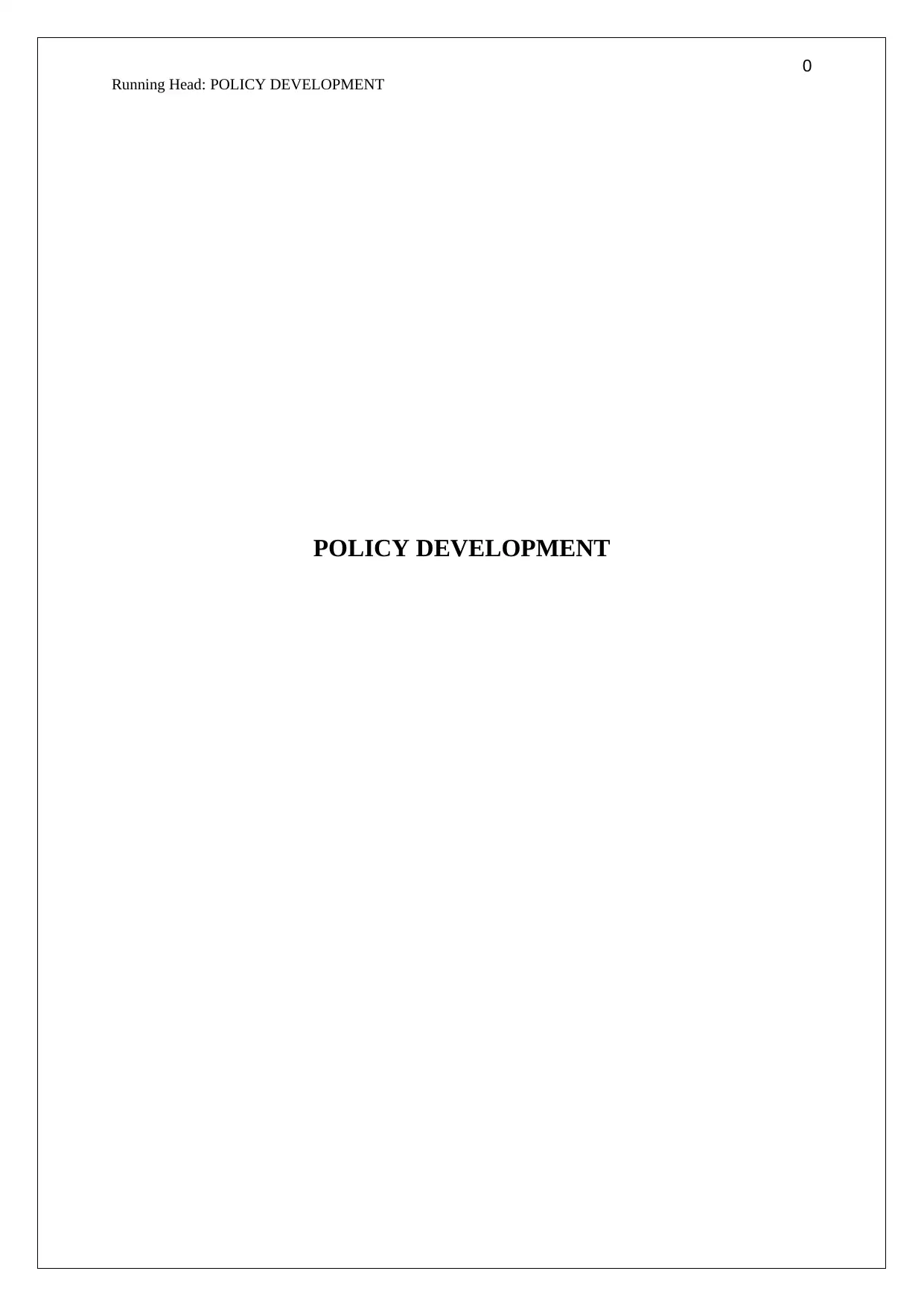
0
Running Head: POLICY DEVELOPMENT
POLICY DEVELOPMENT
Running Head: POLICY DEVELOPMENT
POLICY DEVELOPMENT
Paraphrase This Document
Need a fresh take? Get an instant paraphrase of this document with our AI Paraphraser
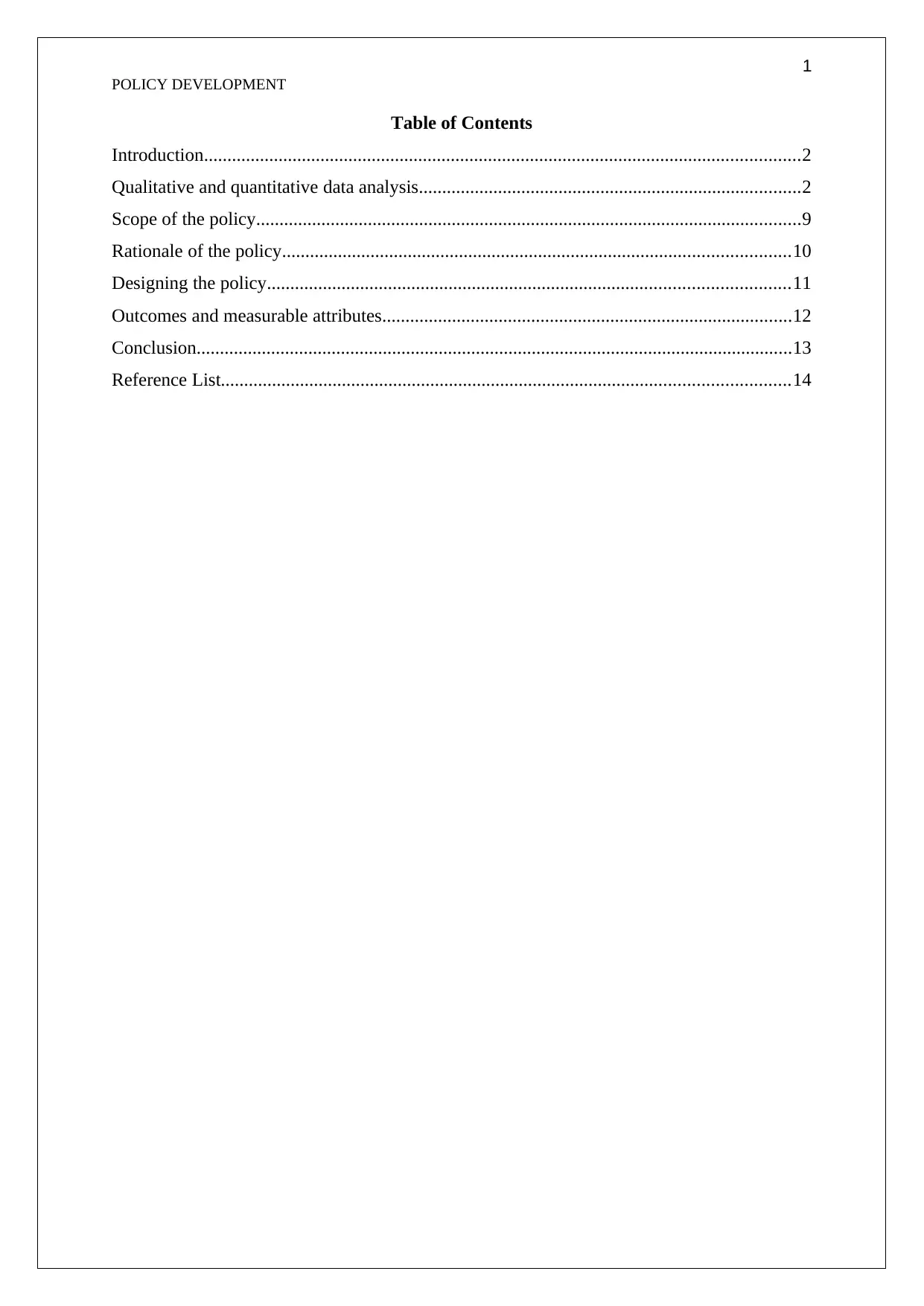
1
POLICY DEVELOPMENT
Table of Contents
Introduction................................................................................................................................2
Qualitative and quantitative data analysis..................................................................................2
Scope of the policy.....................................................................................................................9
Rationale of the policy.............................................................................................................10
Designing the policy................................................................................................................11
Outcomes and measurable attributes........................................................................................12
Conclusion................................................................................................................................13
Reference List..........................................................................................................................14
POLICY DEVELOPMENT
Table of Contents
Introduction................................................................................................................................2
Qualitative and quantitative data analysis..................................................................................2
Scope of the policy.....................................................................................................................9
Rationale of the policy.............................................................................................................10
Designing the policy................................................................................................................11
Outcomes and measurable attributes........................................................................................12
Conclusion................................................................................................................................13
Reference List..........................................................................................................................14
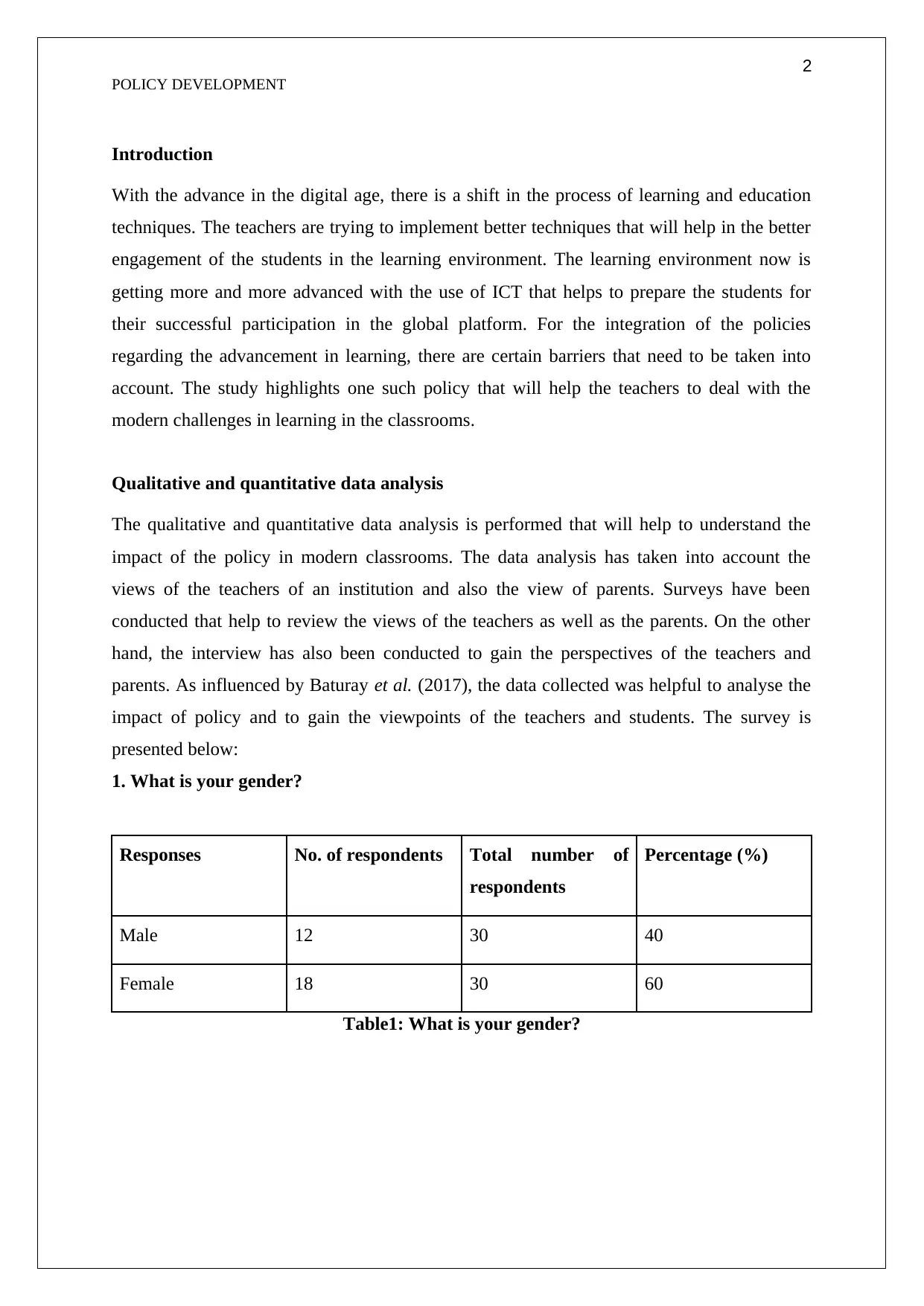
2
POLICY DEVELOPMENT
Introduction
With the advance in the digital age, there is a shift in the process of learning and education
techniques. The teachers are trying to implement better techniques that will help in the better
engagement of the students in the learning environment. The learning environment now is
getting more and more advanced with the use of ICT that helps to prepare the students for
their successful participation in the global platform. For the integration of the policies
regarding the advancement in learning, there are certain barriers that need to be taken into
account. The study highlights one such policy that will help the teachers to deal with the
modern challenges in learning in the classrooms.
Qualitative and quantitative data analysis
The qualitative and quantitative data analysis is performed that will help to understand the
impact of the policy in modern classrooms. The data analysis has taken into account the
views of the teachers of an institution and also the view of parents. Surveys have been
conducted that help to review the views of the teachers as well as the parents. On the other
hand, the interview has also been conducted to gain the perspectives of the teachers and
parents. As influenced by Baturay et al. (2017), the data collected was helpful to analyse the
impact of policy and to gain the viewpoints of the teachers and students. The survey is
presented below:
1. What is your gender?
Responses No. of respondents Total number of
respondents
Percentage (%)
Male 12 30 40
Female 18 30 60
Table1: What is your gender?
POLICY DEVELOPMENT
Introduction
With the advance in the digital age, there is a shift in the process of learning and education
techniques. The teachers are trying to implement better techniques that will help in the better
engagement of the students in the learning environment. The learning environment now is
getting more and more advanced with the use of ICT that helps to prepare the students for
their successful participation in the global platform. For the integration of the policies
regarding the advancement in learning, there are certain barriers that need to be taken into
account. The study highlights one such policy that will help the teachers to deal with the
modern challenges in learning in the classrooms.
Qualitative and quantitative data analysis
The qualitative and quantitative data analysis is performed that will help to understand the
impact of the policy in modern classrooms. The data analysis has taken into account the
views of the teachers of an institution and also the view of parents. Surveys have been
conducted that help to review the views of the teachers as well as the parents. On the other
hand, the interview has also been conducted to gain the perspectives of the teachers and
parents. As influenced by Baturay et al. (2017), the data collected was helpful to analyse the
impact of policy and to gain the viewpoints of the teachers and students. The survey is
presented below:
1. What is your gender?
Responses No. of respondents Total number of
respondents
Percentage (%)
Male 12 30 40
Female 18 30 60
Table1: What is your gender?
⊘ This is a preview!⊘
Do you want full access?
Subscribe today to unlock all pages.

Trusted by 1+ million students worldwide
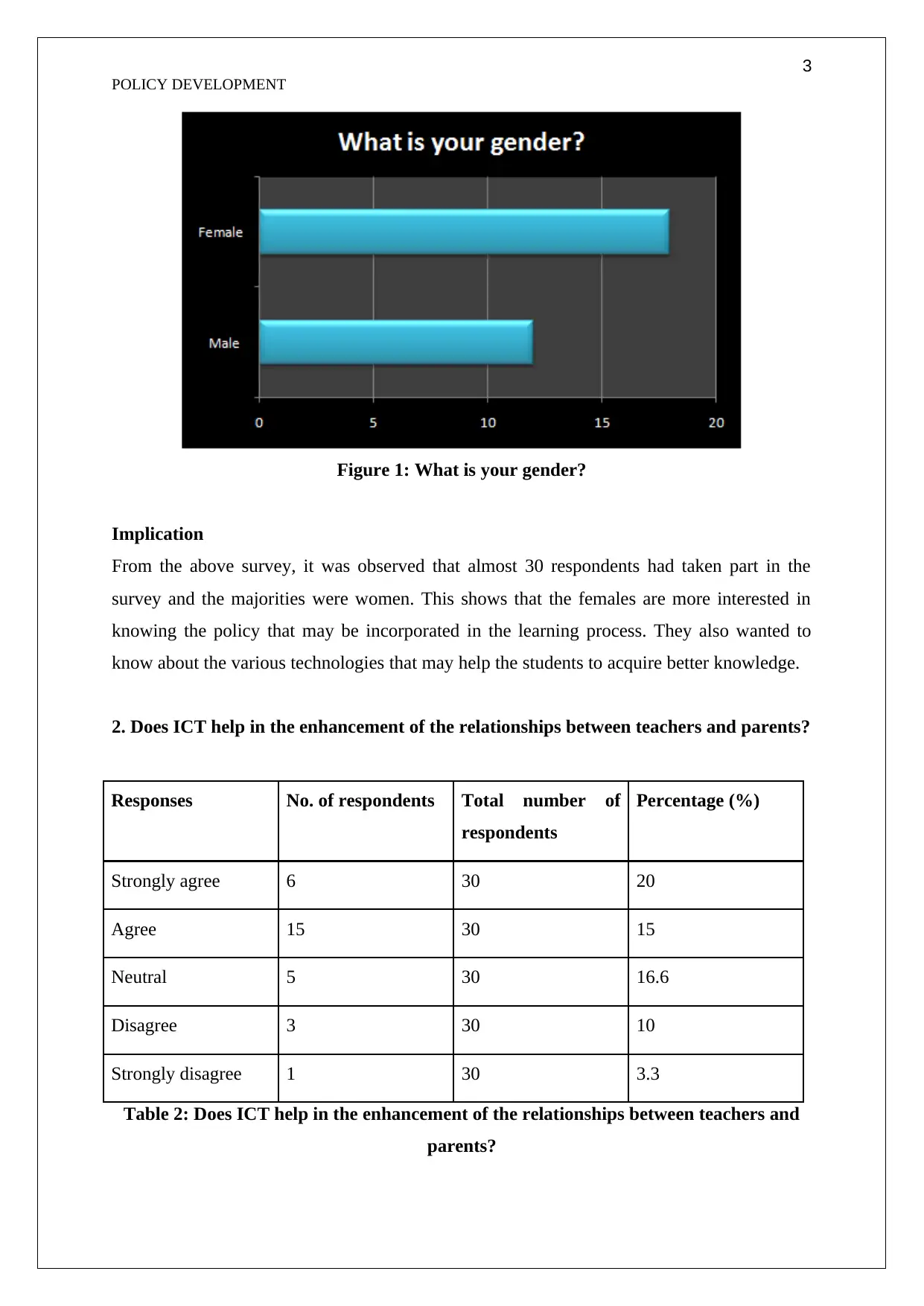
3
POLICY DEVELOPMENT
Figure 1: What is your gender?
Implication
From the above survey, it was observed that almost 30 respondents had taken part in the
survey and the majorities were women. This shows that the females are more interested in
knowing the policy that may be incorporated in the learning process. They also wanted to
know about the various technologies that may help the students to acquire better knowledge.
2. Does ICT help in the enhancement of the relationships between teachers and parents?
Responses No. of respondents Total number of
respondents
Percentage (%)
Strongly agree 6 30 20
Agree 15 30 15
Neutral 5 30 16.6
Disagree 3 30 10
Strongly disagree 1 30 3.3
Table 2: Does ICT help in the enhancement of the relationships between teachers and
parents?
POLICY DEVELOPMENT
Figure 1: What is your gender?
Implication
From the above survey, it was observed that almost 30 respondents had taken part in the
survey and the majorities were women. This shows that the females are more interested in
knowing the policy that may be incorporated in the learning process. They also wanted to
know about the various technologies that may help the students to acquire better knowledge.
2. Does ICT help in the enhancement of the relationships between teachers and parents?
Responses No. of respondents Total number of
respondents
Percentage (%)
Strongly agree 6 30 20
Agree 15 30 15
Neutral 5 30 16.6
Disagree 3 30 10
Strongly disagree 1 30 3.3
Table 2: Does ICT help in the enhancement of the relationships between teachers and
parents?
Paraphrase This Document
Need a fresh take? Get an instant paraphrase of this document with our AI Paraphraser
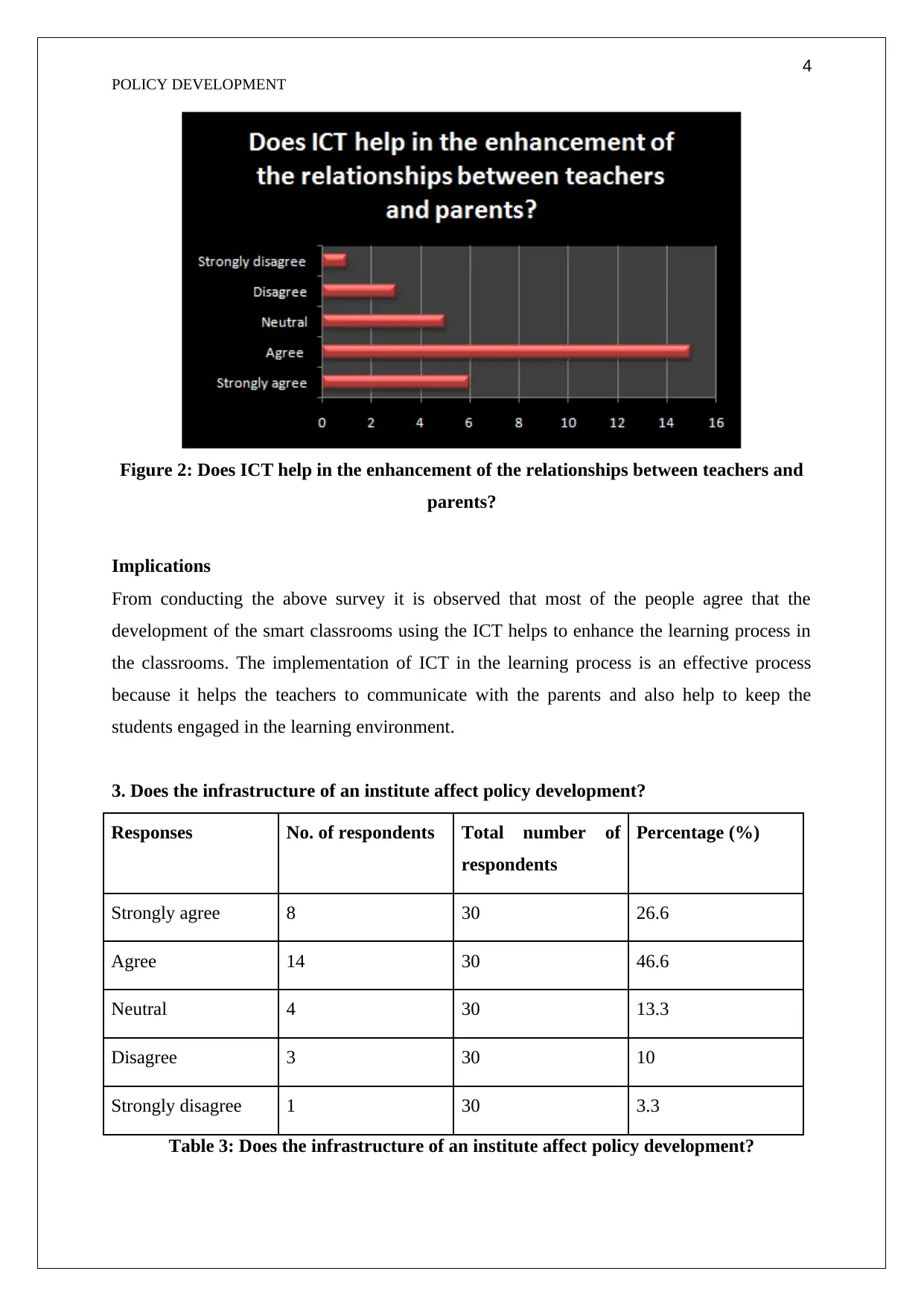
4
POLICY DEVELOPMENT
Figure 2: Does ICT help in the enhancement of the relationships between teachers and
parents?
Implications
From conducting the above survey it is observed that most of the people agree that the
development of the smart classrooms using the ICT helps to enhance the learning process in
the classrooms. The implementation of ICT in the learning process is an effective process
because it helps the teachers to communicate with the parents and also help to keep the
students engaged in the learning environment.
3. Does the infrastructure of an institute affect policy development?
Responses No. of respondents Total number of
respondents
Percentage (%)
Strongly agree 8 30 26.6
Agree 14 30 46.6
Neutral 4 30 13.3
Disagree 3 30 10
Strongly disagree 1 30 3.3
Table 3: Does the infrastructure of an institute affect policy development?
POLICY DEVELOPMENT
Figure 2: Does ICT help in the enhancement of the relationships between teachers and
parents?
Implications
From conducting the above survey it is observed that most of the people agree that the
development of the smart classrooms using the ICT helps to enhance the learning process in
the classrooms. The implementation of ICT in the learning process is an effective process
because it helps the teachers to communicate with the parents and also help to keep the
students engaged in the learning environment.
3. Does the infrastructure of an institute affect policy development?
Responses No. of respondents Total number of
respondents
Percentage (%)
Strongly agree 8 30 26.6
Agree 14 30 46.6
Neutral 4 30 13.3
Disagree 3 30 10
Strongly disagree 1 30 3.3
Table 3: Does the infrastructure of an institute affect policy development?
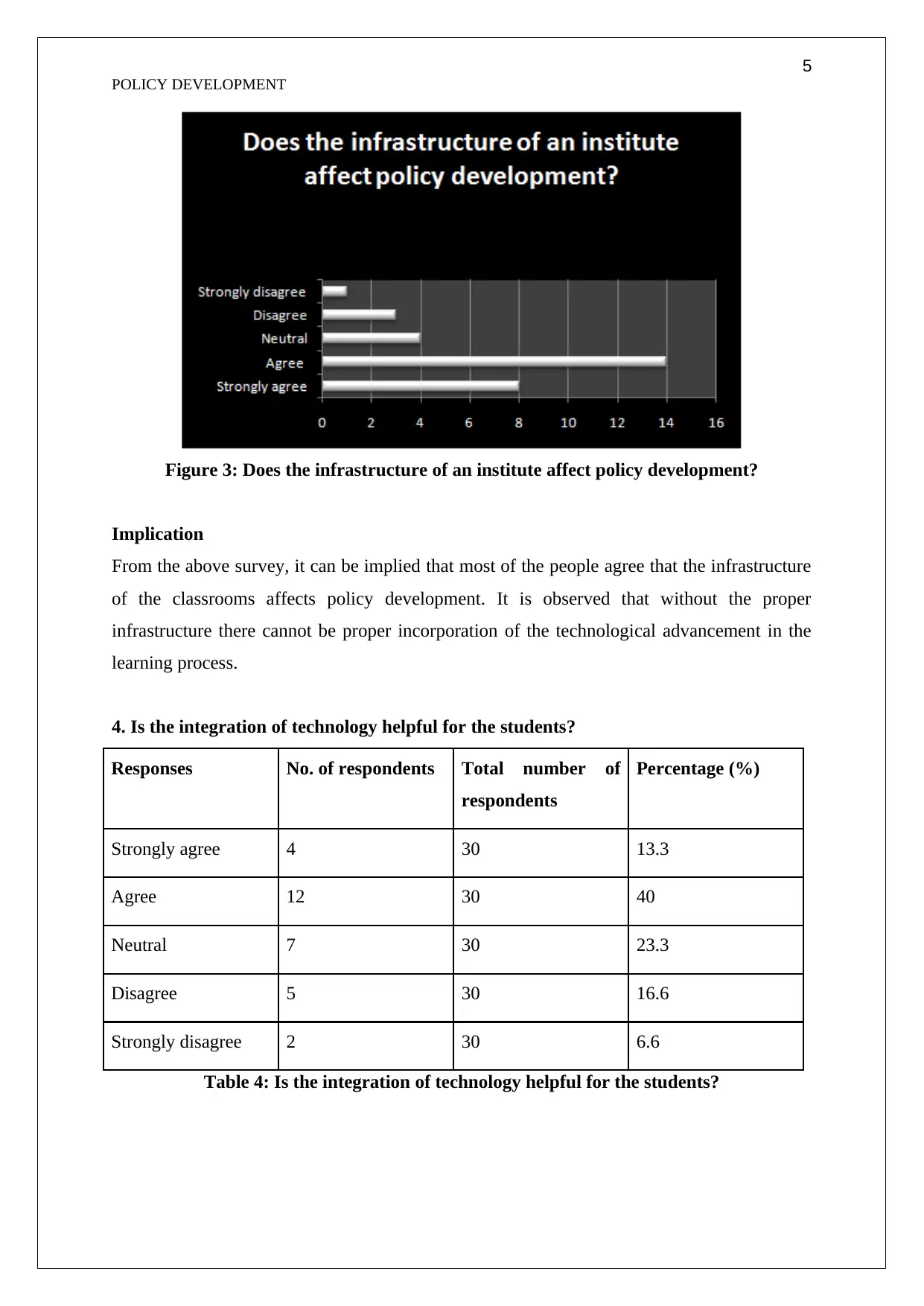
5
POLICY DEVELOPMENT
Figure 3: Does the infrastructure of an institute affect policy development?
Implication
From the above survey, it can be implied that most of the people agree that the infrastructure
of the classrooms affects policy development. It is observed that without the proper
infrastructure there cannot be proper incorporation of the technological advancement in the
learning process.
4. Is the integration of technology helpful for the students?
Responses No. of respondents Total number of
respondents
Percentage (%)
Strongly agree 4 30 13.3
Agree 12 30 40
Neutral 7 30 23.3
Disagree 5 30 16.6
Strongly disagree 2 30 6.6
Table 4: Is the integration of technology helpful for the students?
POLICY DEVELOPMENT
Figure 3: Does the infrastructure of an institute affect policy development?
Implication
From the above survey, it can be implied that most of the people agree that the infrastructure
of the classrooms affects policy development. It is observed that without the proper
infrastructure there cannot be proper incorporation of the technological advancement in the
learning process.
4. Is the integration of technology helpful for the students?
Responses No. of respondents Total number of
respondents
Percentage (%)
Strongly agree 4 30 13.3
Agree 12 30 40
Neutral 7 30 23.3
Disagree 5 30 16.6
Strongly disagree 2 30 6.6
Table 4: Is the integration of technology helpful for the students?
⊘ This is a preview!⊘
Do you want full access?
Subscribe today to unlock all pages.

Trusted by 1+ million students worldwide
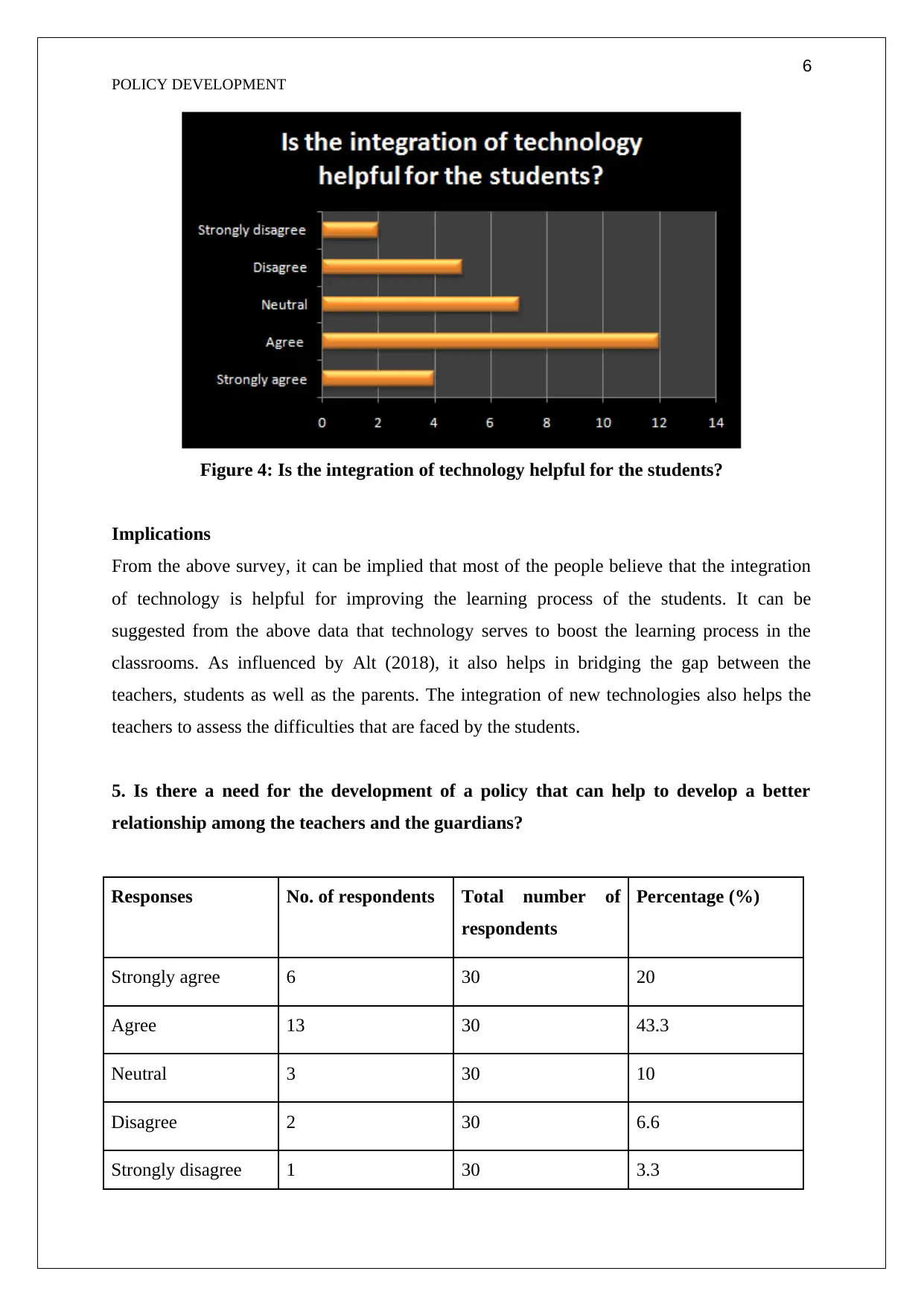
6
POLICY DEVELOPMENT
Figure 4: Is the integration of technology helpful for the students?
Implications
From the above survey, it can be implied that most of the people believe that the integration
of technology is helpful for improving the learning process of the students. It can be
suggested from the above data that technology serves to boost the learning process in the
classrooms. As influenced by Alt (2018), it also helps in bridging the gap between the
teachers, students as well as the parents. The integration of new technologies also helps the
teachers to assess the difficulties that are faced by the students.
5. Is there a need for the development of a policy that can help to develop a better
relationship among the teachers and the guardians?
Responses No. of respondents Total number of
respondents
Percentage (%)
Strongly agree 6 30 20
Agree 13 30 43.3
Neutral 3 30 10
Disagree 2 30 6.6
Strongly disagree 1 30 3.3
POLICY DEVELOPMENT
Figure 4: Is the integration of technology helpful for the students?
Implications
From the above survey, it can be implied that most of the people believe that the integration
of technology is helpful for improving the learning process of the students. It can be
suggested from the above data that technology serves to boost the learning process in the
classrooms. As influenced by Alt (2018), it also helps in bridging the gap between the
teachers, students as well as the parents. The integration of new technologies also helps the
teachers to assess the difficulties that are faced by the students.
5. Is there a need for the development of a policy that can help to develop a better
relationship among the teachers and the guardians?
Responses No. of respondents Total number of
respondents
Percentage (%)
Strongly agree 6 30 20
Agree 13 30 43.3
Neutral 3 30 10
Disagree 2 30 6.6
Strongly disagree 1 30 3.3
Paraphrase This Document
Need a fresh take? Get an instant paraphrase of this document with our AI Paraphraser
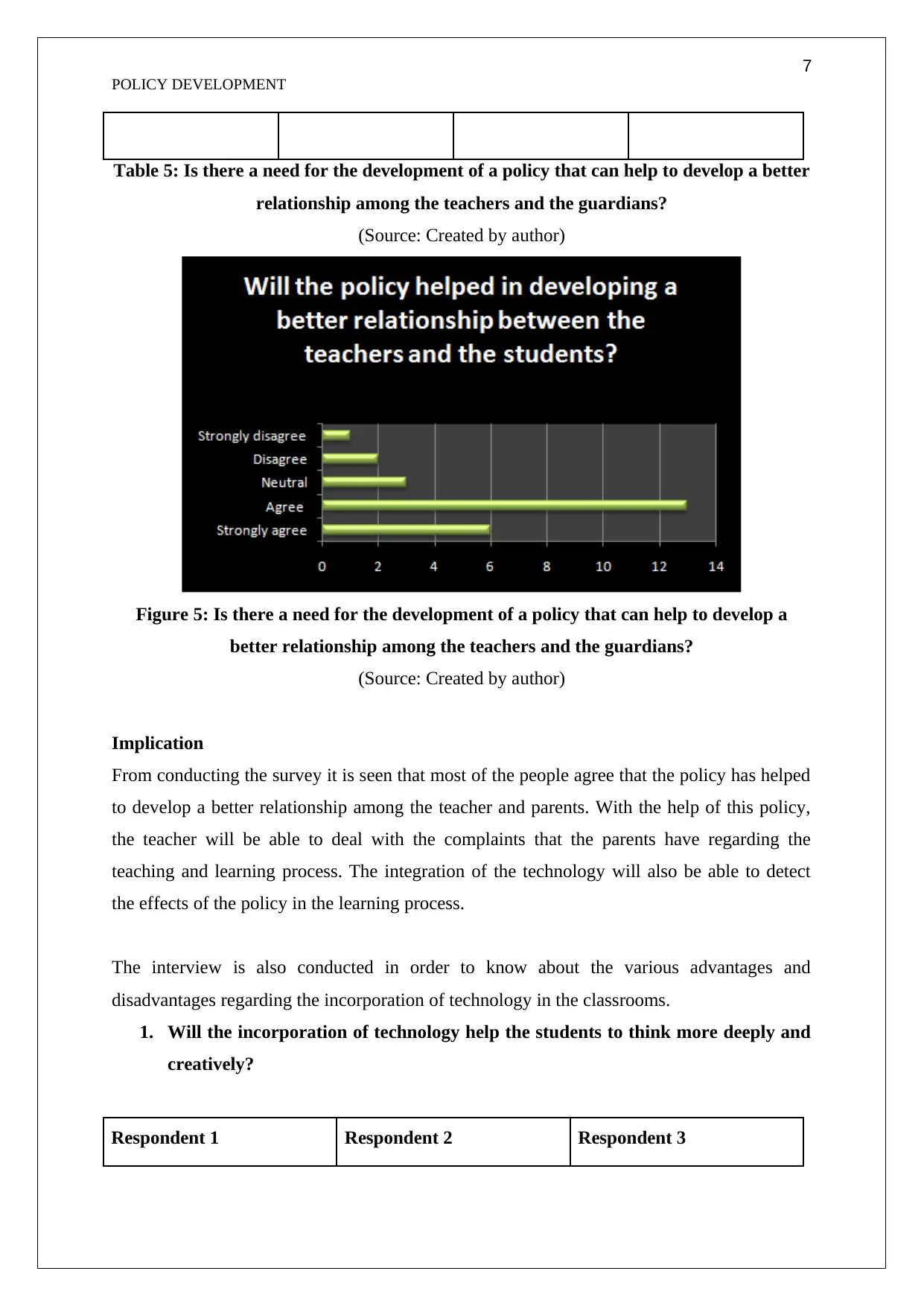
7
POLICY DEVELOPMENT
Table 5: Is there a need for the development of a policy that can help to develop a better
relationship among the teachers and the guardians?
(Source: Created by author)
Figure 5: Is there a need for the development of a policy that can help to develop a
better relationship among the teachers and the guardians?
(Source: Created by author)
Implication
From conducting the survey it is seen that most of the people agree that the policy has helped
to develop a better relationship among the teacher and parents. With the help of this policy,
the teacher will be able to deal with the complaints that the parents have regarding the
teaching and learning process. The integration of the technology will also be able to detect
the effects of the policy in the learning process.
The interview is also conducted in order to know about the various advantages and
disadvantages regarding the incorporation of technology in the classrooms.
1. Will the incorporation of technology help the students to think more deeply and
creatively?
Respondent 1 Respondent 2 Respondent 3
POLICY DEVELOPMENT
Table 5: Is there a need for the development of a policy that can help to develop a better
relationship among the teachers and the guardians?
(Source: Created by author)
Figure 5: Is there a need for the development of a policy that can help to develop a
better relationship among the teachers and the guardians?
(Source: Created by author)
Implication
From conducting the survey it is seen that most of the people agree that the policy has helped
to develop a better relationship among the teacher and parents. With the help of this policy,
the teacher will be able to deal with the complaints that the parents have regarding the
teaching and learning process. The integration of the technology will also be able to detect
the effects of the policy in the learning process.
The interview is also conducted in order to know about the various advantages and
disadvantages regarding the incorporation of technology in the classrooms.
1. Will the incorporation of technology help the students to think more deeply and
creatively?
Respondent 1 Respondent 2 Respondent 3
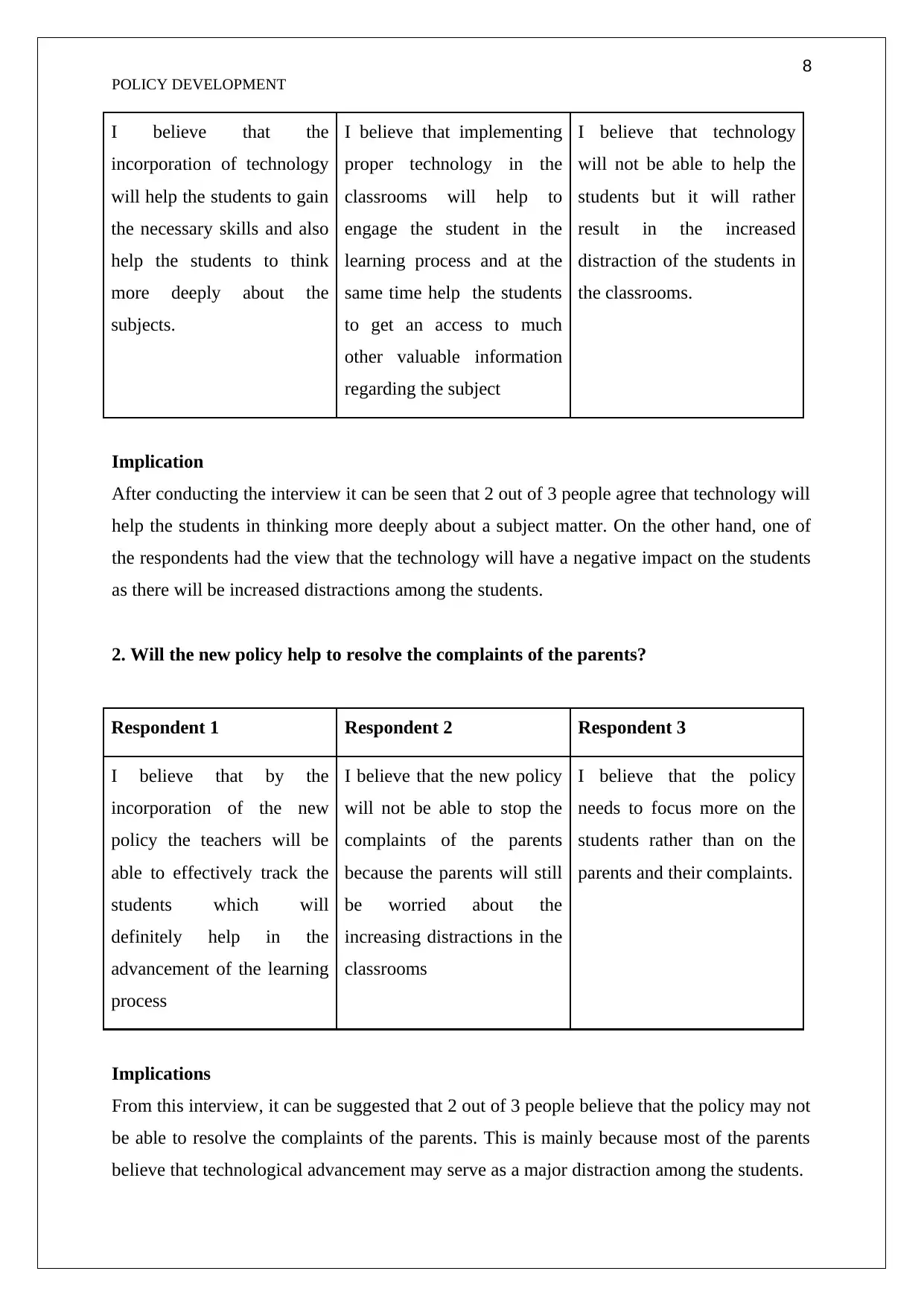
8
POLICY DEVELOPMENT
I believe that the
incorporation of technology
will help the students to gain
the necessary skills and also
help the students to think
more deeply about the
subjects.
I believe that implementing
proper technology in the
classrooms will help to
engage the student in the
learning process and at the
same time help the students
to get an access to much
other valuable information
regarding the subject
I believe that technology
will not be able to help the
students but it will rather
result in the increased
distraction of the students in
the classrooms.
Implication
After conducting the interview it can be seen that 2 out of 3 people agree that technology will
help the students in thinking more deeply about a subject matter. On the other hand, one of
the respondents had the view that the technology will have a negative impact on the students
as there will be increased distractions among the students.
2. Will the new policy help to resolve the complaints of the parents?
Respondent 1 Respondent 2 Respondent 3
I believe that by the
incorporation of the new
policy the teachers will be
able to effectively track the
students which will
definitely help in the
advancement of the learning
process
I believe that the new policy
will not be able to stop the
complaints of the parents
because the parents will still
be worried about the
increasing distractions in the
classrooms
I believe that the policy
needs to focus more on the
students rather than on the
parents and their complaints.
Implications
From this interview, it can be suggested that 2 out of 3 people believe that the policy may not
be able to resolve the complaints of the parents. This is mainly because most of the parents
believe that technological advancement may serve as a major distraction among the students.
POLICY DEVELOPMENT
I believe that the
incorporation of technology
will help the students to gain
the necessary skills and also
help the students to think
more deeply about the
subjects.
I believe that implementing
proper technology in the
classrooms will help to
engage the student in the
learning process and at the
same time help the students
to get an access to much
other valuable information
regarding the subject
I believe that technology
will not be able to help the
students but it will rather
result in the increased
distraction of the students in
the classrooms.
Implication
After conducting the interview it can be seen that 2 out of 3 people agree that technology will
help the students in thinking more deeply about a subject matter. On the other hand, one of
the respondents had the view that the technology will have a negative impact on the students
as there will be increased distractions among the students.
2. Will the new policy help to resolve the complaints of the parents?
Respondent 1 Respondent 2 Respondent 3
I believe that by the
incorporation of the new
policy the teachers will be
able to effectively track the
students which will
definitely help in the
advancement of the learning
process
I believe that the new policy
will not be able to stop the
complaints of the parents
because the parents will still
be worried about the
increasing distractions in the
classrooms
I believe that the policy
needs to focus more on the
students rather than on the
parents and their complaints.
Implications
From this interview, it can be suggested that 2 out of 3 people believe that the policy may not
be able to resolve the complaints of the parents. This is mainly because most of the parents
believe that technological advancement may serve as a major distraction among the students.
⊘ This is a preview!⊘
Do you want full access?
Subscribe today to unlock all pages.

Trusted by 1+ million students worldwide
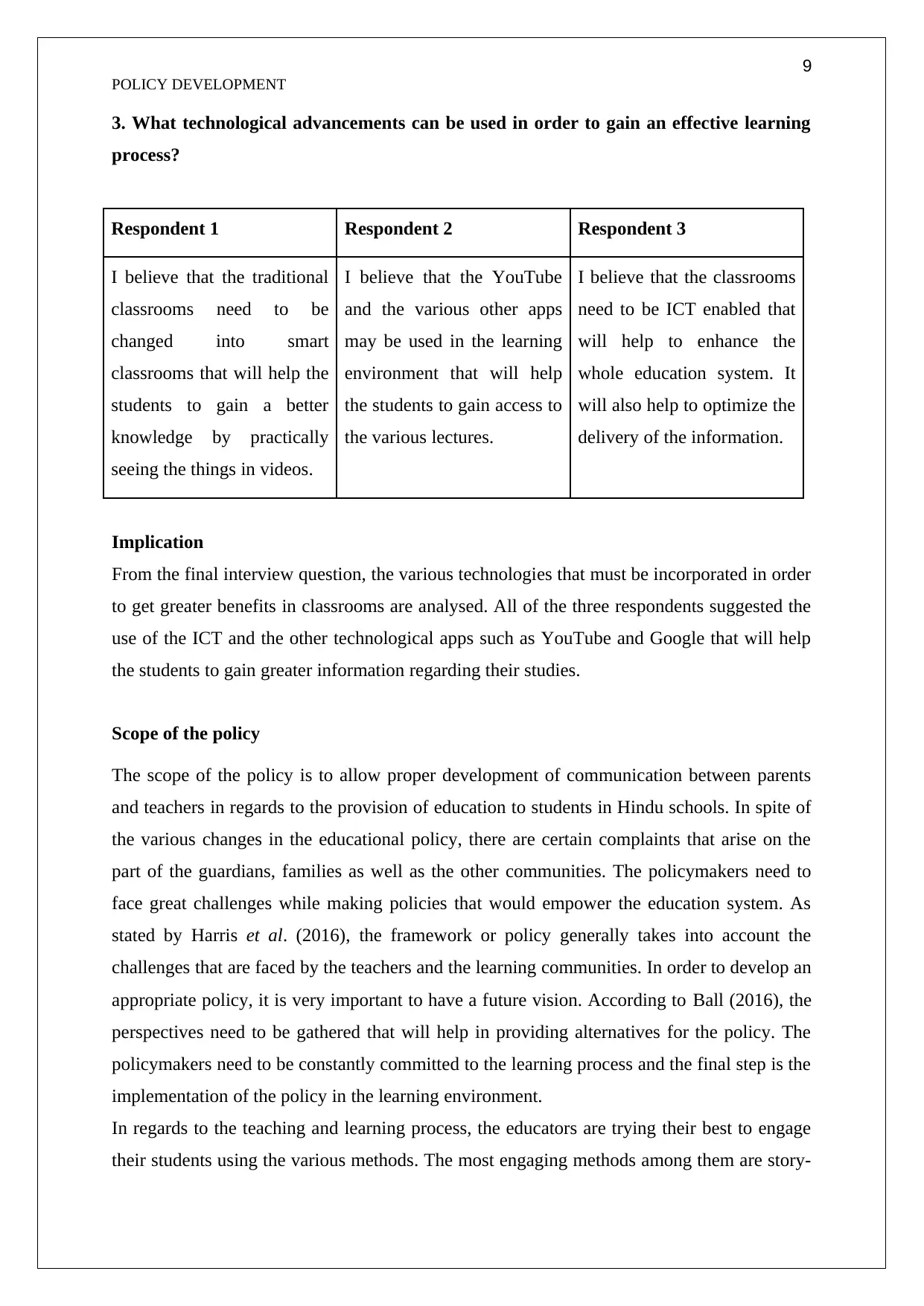
9
POLICY DEVELOPMENT
3. What technological advancements can be used in order to gain an effective learning
process?
Respondent 1 Respondent 2 Respondent 3
I believe that the traditional
classrooms need to be
changed into smart
classrooms that will help the
students to gain a better
knowledge by practically
seeing the things in videos.
I believe that the YouTube
and the various other apps
may be used in the learning
environment that will help
the students to gain access to
the various lectures.
I believe that the classrooms
need to be ICT enabled that
will help to enhance the
whole education system. It
will also help to optimize the
delivery of the information.
Implication
From the final interview question, the various technologies that must be incorporated in order
to get greater benefits in classrooms are analysed. All of the three respondents suggested the
use of the ICT and the other technological apps such as YouTube and Google that will help
the students to gain greater information regarding their studies.
Scope of the policy
The scope of the policy is to allow proper development of communication between parents
and teachers in regards to the provision of education to students in Hindu schools. In spite of
the various changes in the educational policy, there are certain complaints that arise on the
part of the guardians, families as well as the other communities. The policymakers need to
face great challenges while making policies that would empower the education system. As
stated by Harris et al. (2016), the framework or policy generally takes into account the
challenges that are faced by the teachers and the learning communities. In order to develop an
appropriate policy, it is very important to have a future vision. According to Ball (2016), the
perspectives need to be gathered that will help in providing alternatives for the policy. The
policymakers need to be constantly committed to the learning process and the final step is the
implementation of the policy in the learning environment.
In regards to the teaching and learning process, the educators are trying their best to engage
their students using the various methods. The most engaging methods among them are story-
POLICY DEVELOPMENT
3. What technological advancements can be used in order to gain an effective learning
process?
Respondent 1 Respondent 2 Respondent 3
I believe that the traditional
classrooms need to be
changed into smart
classrooms that will help the
students to gain a better
knowledge by practically
seeing the things in videos.
I believe that the YouTube
and the various other apps
may be used in the learning
environment that will help
the students to gain access to
the various lectures.
I believe that the classrooms
need to be ICT enabled that
will help to enhance the
whole education system. It
will also help to optimize the
delivery of the information.
Implication
From the final interview question, the various technologies that must be incorporated in order
to get greater benefits in classrooms are analysed. All of the three respondents suggested the
use of the ICT and the other technological apps such as YouTube and Google that will help
the students to gain greater information regarding their studies.
Scope of the policy
The scope of the policy is to allow proper development of communication between parents
and teachers in regards to the provision of education to students in Hindu schools. In spite of
the various changes in the educational policy, there are certain complaints that arise on the
part of the guardians, families as well as the other communities. The policymakers need to
face great challenges while making policies that would empower the education system. As
stated by Harris et al. (2016), the framework or policy generally takes into account the
challenges that are faced by the teachers and the learning communities. In order to develop an
appropriate policy, it is very important to have a future vision. According to Ball (2016), the
perspectives need to be gathered that will help in providing alternatives for the policy. The
policymakers need to be constantly committed to the learning process and the final step is the
implementation of the policy in the learning environment.
In regards to the teaching and learning process, the educators are trying their best to engage
their students using the various methods. The most engaging methods among them are story-
Paraphrase This Document
Need a fresh take? Get an instant paraphrase of this document with our AI Paraphraser
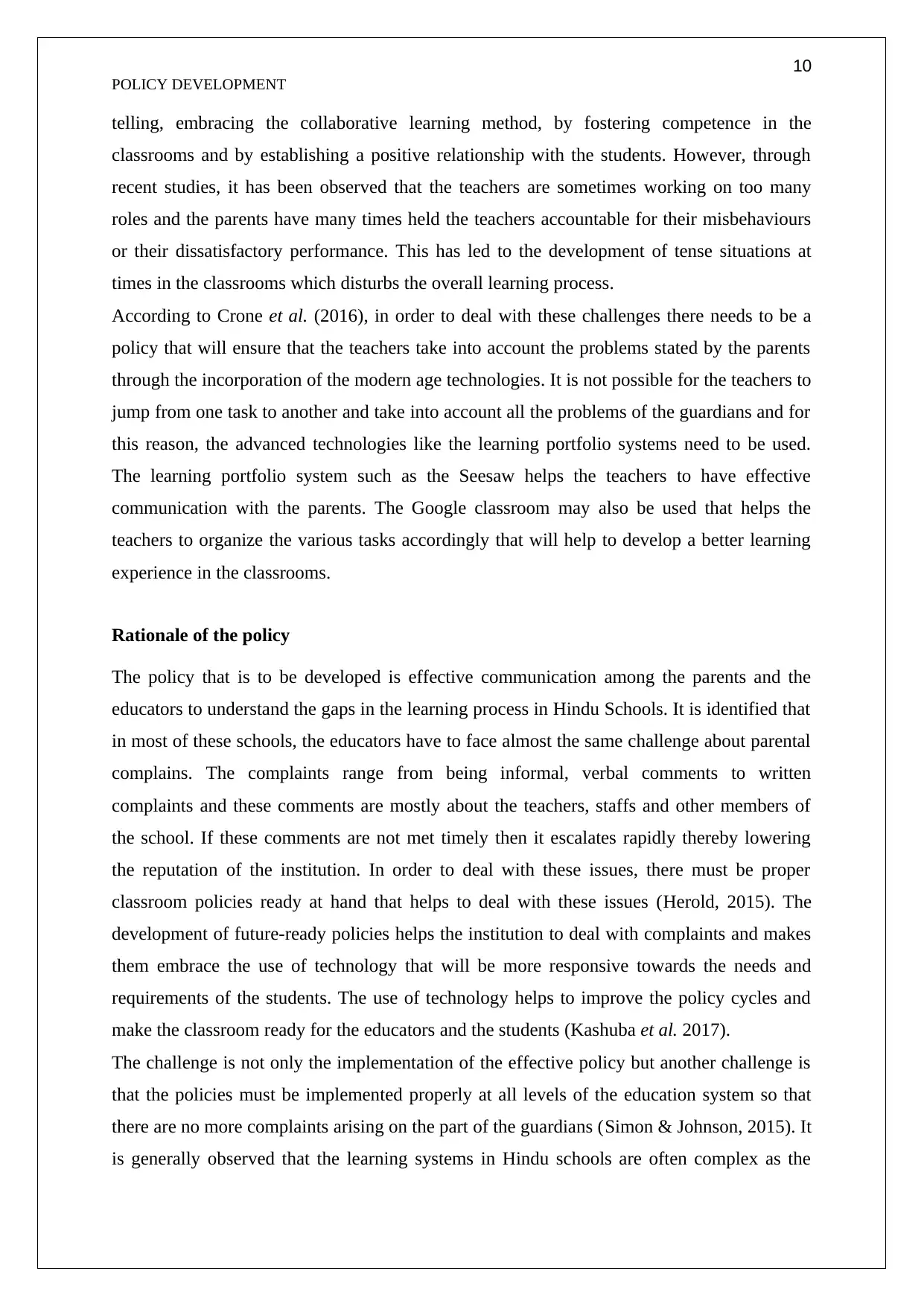
10
POLICY DEVELOPMENT
telling, embracing the collaborative learning method, by fostering competence in the
classrooms and by establishing a positive relationship with the students. However, through
recent studies, it has been observed that the teachers are sometimes working on too many
roles and the parents have many times held the teachers accountable for their misbehaviours
or their dissatisfactory performance. This has led to the development of tense situations at
times in the classrooms which disturbs the overall learning process.
According to Crone et al. (2016), in order to deal with these challenges there needs to be a
policy that will ensure that the teachers take into account the problems stated by the parents
through the incorporation of the modern age technologies. It is not possible for the teachers to
jump from one task to another and take into account all the problems of the guardians and for
this reason, the advanced technologies like the learning portfolio systems need to be used.
The learning portfolio system such as the Seesaw helps the teachers to have effective
communication with the parents. The Google classroom may also be used that helps the
teachers to organize the various tasks accordingly that will help to develop a better learning
experience in the classrooms.
Rationale of the policy
The policy that is to be developed is effective communication among the parents and the
educators to understand the gaps in the learning process in Hindu Schools. It is identified that
in most of these schools, the educators have to face almost the same challenge about parental
complains. The complaints range from being informal, verbal comments to written
complaints and these comments are mostly about the teachers, staffs and other members of
the school. If these comments are not met timely then it escalates rapidly thereby lowering
the reputation of the institution. In order to deal with these issues, there must be proper
classroom policies ready at hand that helps to deal with these issues (Herold, 2015). The
development of future-ready policies helps the institution to deal with complaints and makes
them embrace the use of technology that will be more responsive towards the needs and
requirements of the students. The use of technology helps to improve the policy cycles and
make the classroom ready for the educators and the students (Kashuba et al. 2017).
The challenge is not only the implementation of the effective policy but another challenge is
that the policies must be implemented properly at all levels of the education system so that
there are no more complaints arising on the part of the guardians (Simon & Johnson, 2015). It
is generally observed that the learning systems in Hindu schools are often complex as the
POLICY DEVELOPMENT
telling, embracing the collaborative learning method, by fostering competence in the
classrooms and by establishing a positive relationship with the students. However, through
recent studies, it has been observed that the teachers are sometimes working on too many
roles and the parents have many times held the teachers accountable for their misbehaviours
or their dissatisfactory performance. This has led to the development of tense situations at
times in the classrooms which disturbs the overall learning process.
According to Crone et al. (2016), in order to deal with these challenges there needs to be a
policy that will ensure that the teachers take into account the problems stated by the parents
through the incorporation of the modern age technologies. It is not possible for the teachers to
jump from one task to another and take into account all the problems of the guardians and for
this reason, the advanced technologies like the learning portfolio systems need to be used.
The learning portfolio system such as the Seesaw helps the teachers to have effective
communication with the parents. The Google classroom may also be used that helps the
teachers to organize the various tasks accordingly that will help to develop a better learning
experience in the classrooms.
Rationale of the policy
The policy that is to be developed is effective communication among the parents and the
educators to understand the gaps in the learning process in Hindu Schools. It is identified that
in most of these schools, the educators have to face almost the same challenge about parental
complains. The complaints range from being informal, verbal comments to written
complaints and these comments are mostly about the teachers, staffs and other members of
the school. If these comments are not met timely then it escalates rapidly thereby lowering
the reputation of the institution. In order to deal with these issues, there must be proper
classroom policies ready at hand that helps to deal with these issues (Herold, 2015). The
development of future-ready policies helps the institution to deal with complaints and makes
them embrace the use of technology that will be more responsive towards the needs and
requirements of the students. The use of technology helps to improve the policy cycles and
make the classroom ready for the educators and the students (Kashuba et al. 2017).
The challenge is not only the implementation of the effective policy but another challenge is
that the policies must be implemented properly at all levels of the education system so that
there are no more complaints arising on the part of the guardians (Simon & Johnson, 2015). It
is generally observed that the learning systems in Hindu schools are often complex as the
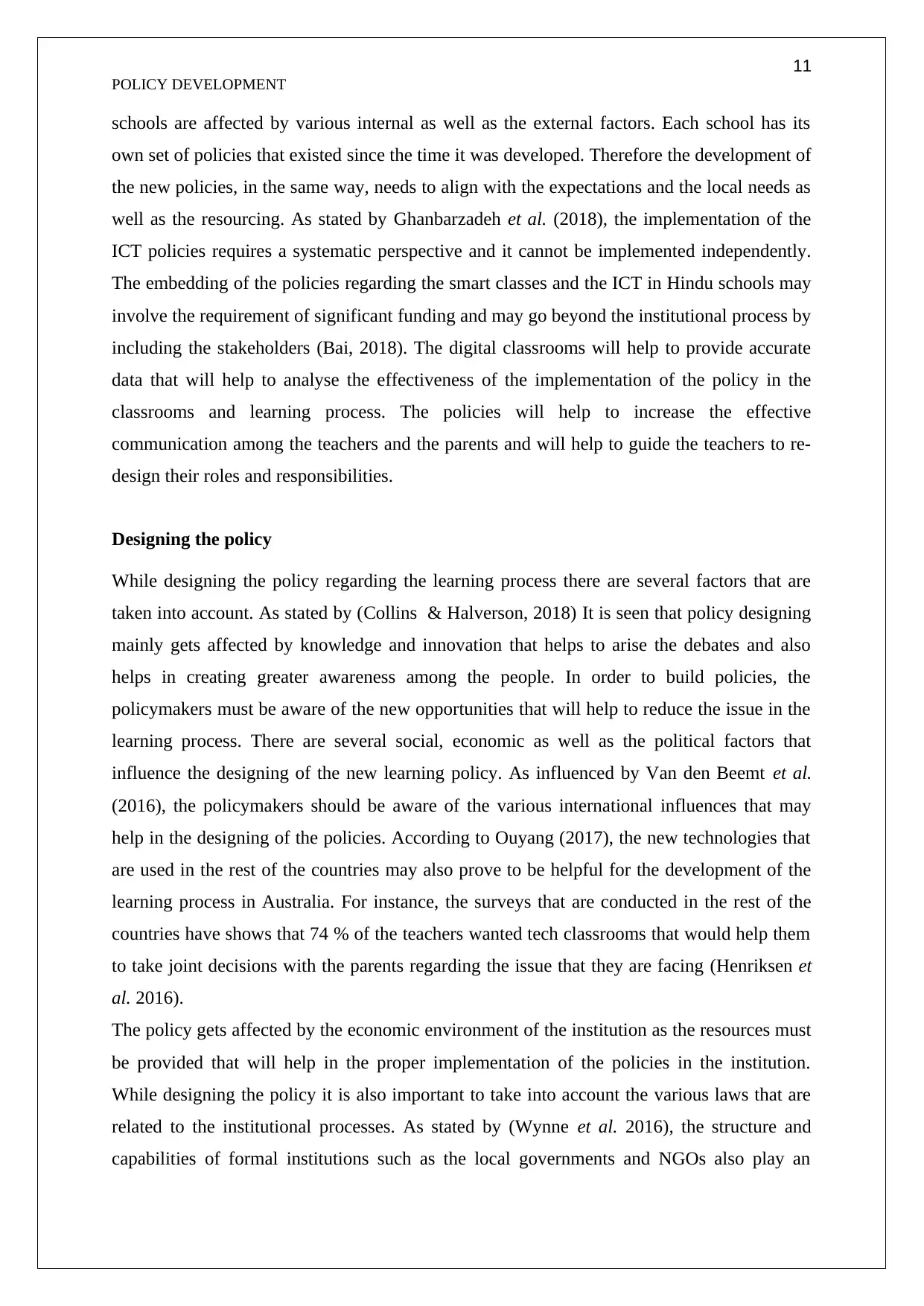
11
POLICY DEVELOPMENT
schools are affected by various internal as well as the external factors. Each school has its
own set of policies that existed since the time it was developed. Therefore the development of
the new policies, in the same way, needs to align with the expectations and the local needs as
well as the resourcing. As stated by Ghanbarzadeh et al. (2018), the implementation of the
ICT policies requires a systematic perspective and it cannot be implemented independently.
The embedding of the policies regarding the smart classes and the ICT in Hindu schools may
involve the requirement of significant funding and may go beyond the institutional process by
including the stakeholders (Bai, 2018). The digital classrooms will help to provide accurate
data that will help to analyse the effectiveness of the implementation of the policy in the
classrooms and learning process. The policies will help to increase the effective
communication among the teachers and the parents and will help to guide the teachers to re-
design their roles and responsibilities.
Designing the policy
While designing the policy regarding the learning process there are several factors that are
taken into account. As stated by (Collins & Halverson, 2018) It is seen that policy designing
mainly gets affected by knowledge and innovation that helps to arise the debates and also
helps in creating greater awareness among the people. In order to build policies, the
policymakers must be aware of the new opportunities that will help to reduce the issue in the
learning process. There are several social, economic as well as the political factors that
influence the designing of the new learning policy. As influenced by Van den Beemt et al.
(2016), the policymakers should be aware of the various international influences that may
help in the designing of the policies. According to Ouyang (2017), the new technologies that
are used in the rest of the countries may also prove to be helpful for the development of the
learning process in Australia. For instance, the surveys that are conducted in the rest of the
countries have shows that 74 % of the teachers wanted tech classrooms that would help them
to take joint decisions with the parents regarding the issue that they are facing (Henriksen et
al. 2016).
The policy gets affected by the economic environment of the institution as the resources must
be provided that will help in the proper implementation of the policies in the institution.
While designing the policy it is also important to take into account the various laws that are
related to the institutional processes. As stated by (Wynne et al. 2016), the structure and
capabilities of formal institutions such as the local governments and NGOs also play an
POLICY DEVELOPMENT
schools are affected by various internal as well as the external factors. Each school has its
own set of policies that existed since the time it was developed. Therefore the development of
the new policies, in the same way, needs to align with the expectations and the local needs as
well as the resourcing. As stated by Ghanbarzadeh et al. (2018), the implementation of the
ICT policies requires a systematic perspective and it cannot be implemented independently.
The embedding of the policies regarding the smart classes and the ICT in Hindu schools may
involve the requirement of significant funding and may go beyond the institutional process by
including the stakeholders (Bai, 2018). The digital classrooms will help to provide accurate
data that will help to analyse the effectiveness of the implementation of the policy in the
classrooms and learning process. The policies will help to increase the effective
communication among the teachers and the parents and will help to guide the teachers to re-
design their roles and responsibilities.
Designing the policy
While designing the policy regarding the learning process there are several factors that are
taken into account. As stated by (Collins & Halverson, 2018) It is seen that policy designing
mainly gets affected by knowledge and innovation that helps to arise the debates and also
helps in creating greater awareness among the people. In order to build policies, the
policymakers must be aware of the new opportunities that will help to reduce the issue in the
learning process. There are several social, economic as well as the political factors that
influence the designing of the new learning policy. As influenced by Van den Beemt et al.
(2016), the policymakers should be aware of the various international influences that may
help in the designing of the policies. According to Ouyang (2017), the new technologies that
are used in the rest of the countries may also prove to be helpful for the development of the
learning process in Australia. For instance, the surveys that are conducted in the rest of the
countries have shows that 74 % of the teachers wanted tech classrooms that would help them
to take joint decisions with the parents regarding the issue that they are facing (Henriksen et
al. 2016).
The policy gets affected by the economic environment of the institution as the resources must
be provided that will help in the proper implementation of the policies in the institution.
While designing the policy it is also important to take into account the various laws that are
related to the institutional processes. As stated by (Wynne et al. 2016), the structure and
capabilities of formal institutions such as the local governments and NGOs also play an
⊘ This is a preview!⊘
Do you want full access?
Subscribe today to unlock all pages.

Trusted by 1+ million students worldwide
1 out of 18
Related Documents
Your All-in-One AI-Powered Toolkit for Academic Success.
+13062052269
info@desklib.com
Available 24*7 on WhatsApp / Email
![[object Object]](/_next/static/media/star-bottom.7253800d.svg)
Unlock your academic potential
Copyright © 2020–2026 A2Z Services. All Rights Reserved. Developed and managed by ZUCOL.




